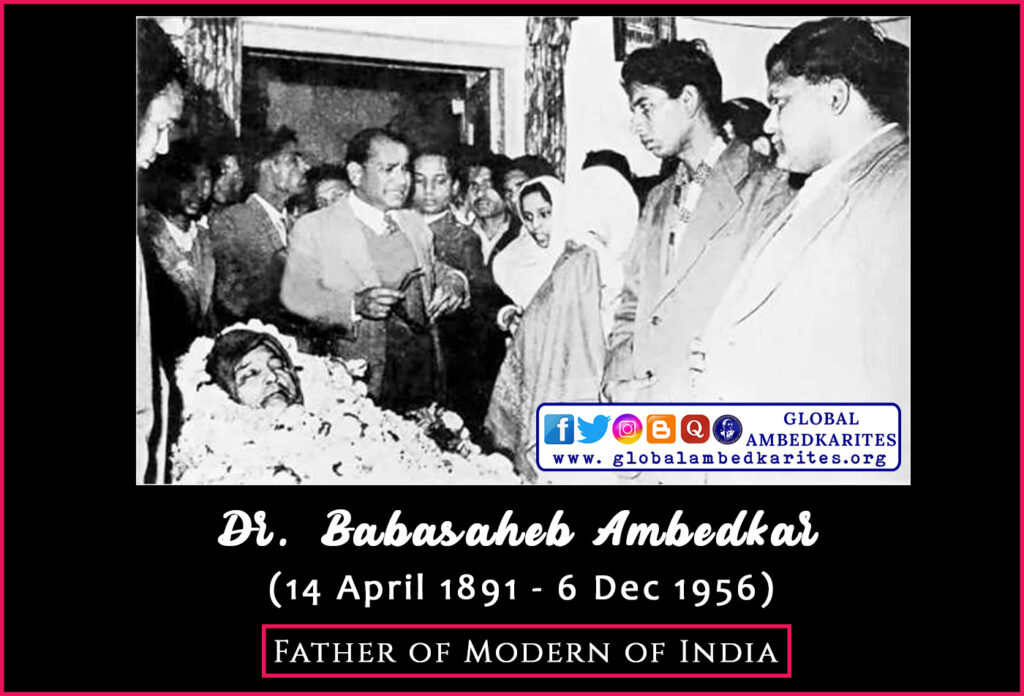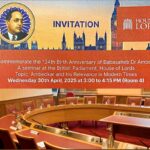
QUESTION 2:
Isn’t it wrong to call 6th December “MahaPariNibbana” Day of Bodhisatta Dr. Ambedkar?
डॉक्टर अम्बेडकर का निब्बान हुआ या परि निब्बान या महापरिनिब्बान या निर्वाण या परि निर्वाण या महापरिनिर्वाण या निवत्त या परि निवत्त या महा परि निवत्त या निव्रत या परि निव्रत या महा परि निव्रत …क्या है सच्चाई…जनिएगा…share भी कीजिएगा.. ऐसी सभी बातें जाने
-Sudhir Raj Singh
Dr. Ambedkar is referred to as BODDHISATTA by many. Meaning.. a person sure to attain Nibbana (Enlightenment) but is not YET an Arahat.
BUT Parinibbana implies he had attained Nibbana during his lifetime.
Can those who say 6th December is MahaPariNibbana Day of Bodhisatta Dr. Ambedkar EXPLAIN THE CONTRADICTION?
=================
There is a general Consensus amongst the learned Bhikkhu Sangha and Buddhist Scholars that the term Parinibbana (Sanskrit: Pari Nirvana) mustn’t be used for anyone UNLESS it has been declared by another Enlightened person (Arahats), that the person in question had been FULLY ENLIGHTENED.
General agreement amongst Bhikkhus is that even for Dr Ambedkar, Parinibbana (PariNirvana) mustn’t be used. Just the reasons are slightly different.
=================
Following is one view (endorsed by senior Bhikkhus and Buddhist scholars):
One term that is very inappropriately used is “Pari Nibbana (& Mahaparinibbana)” often with the sanskritised “Pari-Nirvana”.
Pari Nibbaba/nirvana is a term that is exclusively meant to denote the ceasing of physical life of Arahats ONLY and Maha-PariNibbana for Tathagatha Buddha ONLY.
It is crucial that ALL NEW AND OLD AMBEDKARITE BUDDHISTS must be made aware of this. Many people, Buddhists and non Buddhist Ambedkarites, use these terms at the death of anyone they respect or had great affection for. It is not their fault. They are just not aware of this.
PariNibbana/Nirvana is only used for those who had attained Nibbana /Arhathood /Enlightenment during their lifetime.
If unsure whether a person was enlightened or not, it’s best to avoid Parinibbana.
Buddhists must not use these terms for anyone else, not even for those who are Bodhisattas (Sans. Bodhisatva) because Bodhisattas are those who are yet to become Buddhas.
Re Babasaheb Dr Ambedkar..
Those who use “Bodhisatta Dr Ambedkar” mustn’t use “Parinibanna of Dr Ambedkar”
AND
Those who use “Parinibbana of Dr Ambedkar” mustn’t say Bodhisatva Dr Ambedkar
Its either one or the other or none.
NEVER BOTH.
Saying parnibbana of Bodhistta Dr Ambedkar is contradictory.
Many Buddhists say, “Mahaparinibbana should only be used to refer to Thathagat Buddha”
(People even use Mahaparinibbana for saheb Kanshiramji and others who they hold in high regard and love)
Bh. Vimalakitti Gunasiri says..
1. This message should be sufficient for helping people in understanding the subject matter well enough.
2. The only thing that is always to be borne in mind by every Buddhist is that the Buddhist terminology is an expression of the Enlightened mind (the Buddha mind) and we cannot use it out of context which amounts to disrespect to the Buddha and His Dhamma.
Bhavatu Sabba Mangalam!
– Bhadant Vimalakitti Gunasiri
=================
One scholarly view is that:
There is no difference between Nibbana, Parinibbana and Mahaparinibbana because..
“Pari” simply means “complete”
and “Maha” means “great”.
Is there a difference between Nibbana, complete-Nibbana and great-Nibbana?
Here, “complete” and “great” are simply adjectives describing Nibbana.




